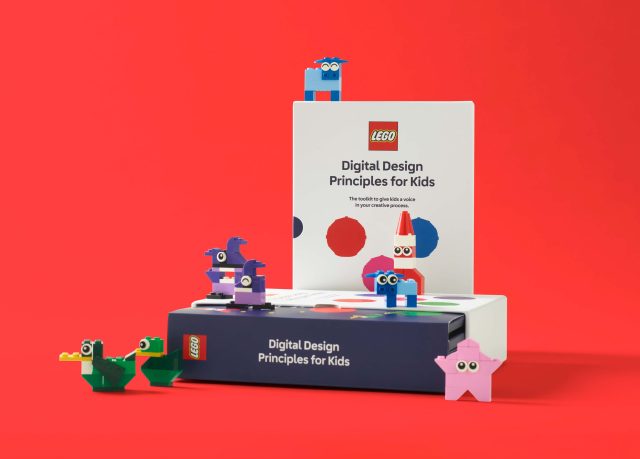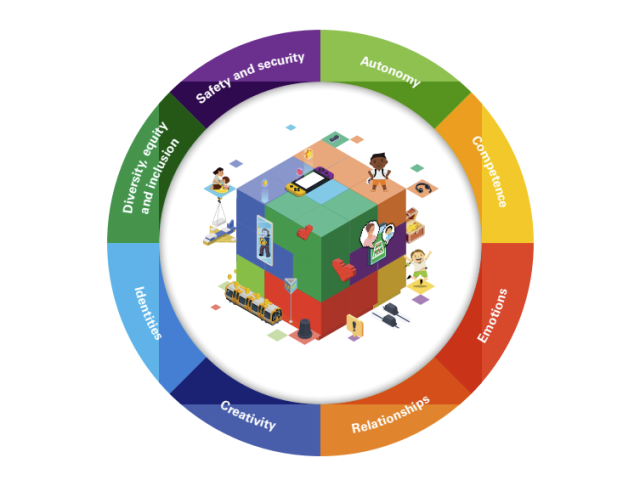An international research project from UNICEF, the LEGO Group and child development experts will develop tools to empower businesses and policymakers to protect and promote children’s well-being in a digital age
COPENHAGEN/FLORENCE, 26 April 2022 – The LEGO Group and UNICEF have joined forces to form the Responsible Innovation in Technology for Children (RITEC) project, funded by the LEGO Foundation, to explore how businesses and policymakers can create a digital world that prioritizes the well-being of children.
ln a landmark study launching today as part of the project, new research from UNICEF and Western Sydney University explores the question: what does well-being mean to children in a digital age? The report prioritizes the voices of children, with over 300 children from 13 countries participating in the study, along with analysis of existing survey data from 34,000 children aged 9-17 across 30 countries.
The online world is an area in which children’s needs and voices have historically been absent, despite the increasing presence of technology in children’s formative years – from how they play and learn, access information, build friendships and more. As digital technology plays an increasingly important role in children’s development, the RITEC project aims to create practical tools for businesses and governments that will empower them to put the well-being of children at the centre of digital design.
Contained within the report is the project’s newly developed well-being framework for children. Made up of eight child-centric well-being outcomes, the framework is a first step towards helping tech developers and policymakers develop a common understanding of how digital experiences can positively influence aspects of child well-being. This can then be used to inform the design of digital products and services used by children, as well as the laws that govern them.
“Digital play experiences help children de-stress, problem solve, build confidence, resilience and a sense of belonging, provided that we properly balance its opportunities against risk of harm. Working together with the LEGO Group – and directly with children themselves – we spotlight tools and opportunities for industry and policymakers that raise the bar on how digital innovation can put the rights and well-being of children,” said Fayaz King, Deputy Executive Director of Field Results and Innovation, UNICEF.
“We believe that digital play holds tremendous potential to enrich children’s lives, but we also recognize the risks that technology creates. And so, we feel a deep responsibility to deliver a digital environment that creates the best possible outcomes for children. We do this by anchoring the well-being of children in how we design our play experiences and, through this exciting collaboration, we will strengthen our leadership in this space while also supporting other companies who are looking to put children’s wellbeing first,” said Anna Rafferty, Vice President of Digital Consumer Engagement, the LEGO Group.
“What this report and the children involved in our workshops revealed is a need to take children’s well-being seriously. It’s all too easy for us to constantly focus on safety and risk, but we can also maximize the benefits children gain from technology. It’s about the overall quality of children’s digital experience. They are asking adults to think about it and they deserve to have us listen,” said Professor Amanda Third, co-author of the report and Professorial Research Fellow and Co-Director Young and Resilient Research Centre, Western Sydney University.
The research findings and framework are being made immediately available to governments and regulators – many of which are grappling with the challenge of regulating digital technology so that it works for the betterment of society, particularly the most vulnerable groups within it, including children.
The next phase of the project will see research teams from New York University, The City University of New York, the University of Sheffield and the Australian Research Council Centre of Excellence for the Digital Child apply multiple research methods to understand how different digital play experiences impact children’s well-being outcomes. From this, the project aims to provide businesses with access to evidence-based tools that will enable design choices more likely to promote the well-being of children. Over time, this is expected to create a more child-centric and sustainable model of digital innovation for the future.
For more information:
Kathleen Sullivan, UNICEF Innocenti, kcsullivan@unicef.org, Tel: +39 0552033222
About RITEC
The RITEC (Responsible Innovation in Technology for Children) project was co-founded by UNICEF and the LEGO Group and is funded by the LEGO Foundation. The project is being delivered in partnership with the Joan Ganz Cooney Centre, the Young & Resilient Research Centre at Western Sydney University; the CREATE Lab at New York University; the Graduate Center, City University of New York; the University of Sheffield and the Australian Research Council Centre of Excellence for the Digital Child.
About the LEGO Group
The LEGO Group’s mission is to inspire and develop the builders of tomorrow through the power of play. The LEGO System in Play, with its foundation in LEGO bricks, allows children and fans to build and rebuild anything they can imagine. The LEGO Group was founded in Billund, Denmark in 1932 by Ole Kirk Kristiansen, its name derived from the two Danish words Leg Godt, which mean “Play Well”. Today, the LEGO Group remains a family-owned company headquartered in Billund. Its products are now sold in more than 130 countries worldwide. For more information: www.LEGO.com
About the LEGO Foundation
The LEGO Foundation aims to inspire and develop the builders of tomorrow; a mission that it shares with the LEGO Group. The LEGO Foundation is dedicated to building a future where learning through play empowers children to become creative, engaged, lifelong learners. Its work is about re-defining play and re-imagining learning. In collaboration with thought leaders, influencers, educators and parents the LEGO Foundation aims to equip, inspire and activate champions for learning through play. Learn more on www.LEGOfoundation.com
About Western Sydney University
Western Sydney University is one of Australia’s leading institutions. Ranked in the top 400 in the world, Western Sydney University is a world-class university with a growing international reach and reputation for academic excellence and impact-driven research. For more information, please visit: Young and Resilient Research Centre | Young and Resilient Research Centre (westernsydney.edu.au)
About the UNICEF Office of Research – Innocenti
The Office of Research – Innocenti is UNICEF’s dedicated research centre. It undertakes research on emerging or current issues in order to inform the strategic directions, policies and programmes of UNICEF and its partners, shape global debates on child rights and development, and inform the global research and policy agenda for all children, and particularly for the most vulnerable. Please visit: www.unicef-irc.org


